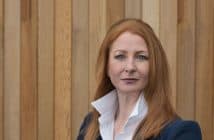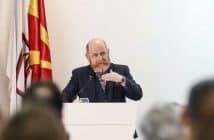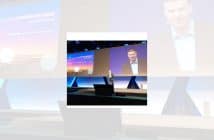U.S. President Barack Obama will seek the help today of Russia’s Vladimir Putin, Syria’s most powerful ally, to bring Bashar al-Assad to the negotiating table and end a two-year civil war.
At their first private face-to-face meeting in a year, Obama will try to find common ground with Putin on the sidelines of a G8 summit in Northern Ireland after angering the Kremlin by authorising U.S. military support for the Syrian president’s opponents.
During talks with British Prime Minister David Cameron in London on the eve of the summit, Putin renewed his criticism of the West’s position in startling tones, describing Assad’s foes as cannibals.
“I think you will not deny that one does not really need to support the people who not only kill their enemies, but open up their bodies, eat their intestines, in front of the public and cameras,” Putin said at a joint news conference with Cameron.
“Are these the people you want to support? Is it them who you want to supply with weapons?”
Cameron conceded London and Moscow remained far apart.
Russia does not buy the West’s assertion that Assad’s forces have used chemical weapons and crossed a red line in doing so, saying U.S. military support for Syrian rebels would only escalate violence.
Washington said on Saturday it would keep F-16 fighters and Patriot missiles in Jordan at Amman’s request, prompting Moscow to bristle at the possibility they could be used to enforce a no-fly zone inside Syria.
Putin’s rhetoric has become increasingly anti-Western since he regained the presidency last year but he appeared upbeat in London, stressing several areas of cooperation between Russian and Britain.
Canadian Prime Minister Stephen Harper criticised Putin for backing Assad and expressed pessimism about the chances of a deal on Syria at the summit.
“Mr Putin and his government are supporting the thugs of the Assad regime for their own reasons that I do not think are justifiable and Mr Putin knows my view on that,” Harper said.
“We are not, unless there is a big shift in position on his part, going to get a common position with him at the G8,” he told a joint news conference with Irish Prime Minister Enda Kenny in Dublin on Sunday.
At the Lough Erne golf resort in Northern Ireland, Cameron will bring together leaders of the United States, Japan, Canada, Russia, Germany, France and Italy – representing just over half of the $71.7 trillion global economy.
Syria will inevitably dominate the Monday-Tuesday talks but persistent worries about the global economy will also be central to the discussions.
Japanese Prime Minister Shinzo Abe, German Chancellor Angela Merkel and other leaders will likely discuss the role of central banks and monetary policy.
They are likely to say they are not content with progress so far in fixing their economies in the wake of the global financial crisis, according to a draft communique seen by Reuters.
Japan’s Abe will use the opportunity to explain his cocktail of fiscal and monetary stimulus known as ‘Abenomics’ to the leaders as investors try to absorb the implications of a signal by the U.S. Federal Reserve that it may start to slow its money-printing.
Fed chairman Ben Bernanke will not attend. He and his colleagues hold a two-day policy meeting on Tuesday and Wednesday.
Bond yields have climbed and share prices have sagged globally since Bernanke shocked investors on May 22 by saying the bank might ‘take a step down’ in the pace of bond purchases – a blow to a global economy still growing well below trend due to the after effects of the great financial crisis.
“Japan’s decisive moves to reflate its economy will support growth in the near term, but it will need to manage the twin challenge of providing near-term stimulus and achieving longer-term sustainability,” the draft communique said, although the version circulated by Britain and seen by Reuters was put together before the recent market turmoil.
The leaders of the European Union and United States are likely to announce the start of formal negotiations on a free trade deal that could be worth more than $100 billion a year to each economy.
EU and U.S. negotiators aim to finish their work by the end of next year.
Cameron has made tackling tax avoidance – which campaigners say costs about $3 trillion a year – one of the key parts of the formal agenda at the summit.
He has turned up the pressure to clamp down on secretive money flows by pressing Britain’s overseas tax havens into a transparency deal and announcing new disclosure rules for British firms.
“It is important we are getting our house in order,” Cameron said on Saturday after representatives of overseas tax havens linked to Britain agreed to sign up to an international transparency protocol.
Aid campaigners said Britain’s action will count for little if the rest of the G8 does not follow suit.
G8 leaders will probably shy away from adopting a measure aimed at curbing tax avoidance by highlighting when companies channel profits into tax havens, and will include a watered-down alternative, according to the draft communique.
Tackling corporate tax avoidance has become a political goal internationally following public anger about revelations over the past year that companies like Apple and Google had used structures U.S. and European politicians said were contrived to minimise the amount of taxes paid.
But the draft summit text suggested there will be no agreement on a rule that would force companies to publish their profits, revenues and tax payments on a country-by-country basis.
Global tax evasion could be costing more than $3 trillion a year, according to researchers from Tax Justice Network while as much as $32 trillion could be hidden by individuals in tax havens. Source: Reuters



